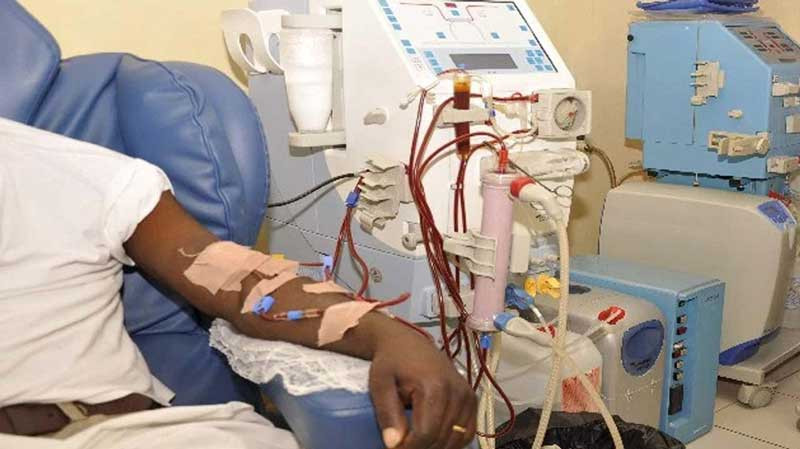The majority of patients receiving renal dialysis die in public hospitals because they cannot afford the much-needed but expensive medical kits, according to medical staff at Mpilo Central Hospital in Bulawayo.
Public hospitals in Zimbabwe offer free renal dialysis, but they are unable to provide the accompanying medical supplies or sundries that patients must purchase on their own.
Patients who need dialysis require about US$800 or more a month for the kits, which is too costly for some families.
This bleak situation was presented to the Parliamentary Committee on Health and Child Care, which visited Mpilo on Monday to discuss citizens’ access to public healthcare, which raised concerns that the wealthy in Zimbabwe are the ones who can afford full kidney dialysis.
“It is very expensive to do dialysis. A catheter costs US$90 for an authentic one. There are some companies selling catheters for US$30 to US$40 but they are not good. Patients bleed when they are inserted,” said the Sister in Charge of the renal unit, Dartisiwe Nkomo.
“The dialysis kits we are talking of, in pharmacies that last I checked it was US$90 for a kit. A patient is supposed to have an initiation course and then have three days of subsequent sessions. That is US$90 multiplied by three days and if patients come twice a week, the kit cost goes up to US$180. Then the dialysis is done eight times a month which brings us to US$720. I don’t think anyone can afford that.”
Chairperson of the Portfolio Committee on Health and Child Care, Daniel Molokele questioned what then happened to citizens who cannot afford to raise those funds.
“We are talking about citizens accessing healthcare services, now it is only for a few people. What happens to the majority who don’t have US$800?” Molokele asked.
The Sister in Charge confirmed that patients who cannot afford, “die.”
“Working in that department, what happens is patients come, they are initiated and as time goes on because it is expensive, we lose most of the patients because it’s not practical,” she said.
“Relatives might chip in but as time goes on they withdraw and the individual who is on dialysis remains face-to-face with the situation. The truth is they die because they are being under-dialysed.”
Mpilo Hospital Chief Medical Officer (CMO) Dr Narcisius Dzvanga stated that although renal dialysis treatment is free under the government’s policy, the hospital could only provide a few sundries
“The hospital doesn’t provide what we call the starter pack – the catheter itself and so forth. The government doesn’t have so people buy,” he said, adding that only seven out of 14 haemodialysis machines were currently working.
“Plead for us to have modern ones but the treatment is not as free as we would want where if one walks in with kidney failure, they don’t have to cough up.”
Dr Dzvanga said sundries are a big problem for both Mpilo and patients.
“We are struggling to provide the kits and that’s what people buy. It costs around US$400 to start a session then for daily sessions patients have to cough up.”
The CMO added that patients manage to raise funds for the first session but going forward “most of them failing.”
On whether Mpilo had donors who could assist patients, Dr Dzvanga said the hospital tried a partnership at some stage but it failed.
“This was about 10 years ago but the partnership wasn’t rewarding so (we) pulled out but they are still the main contractor company called Medwise and they are usually paid hefty money to supply the goods,” he said.
“But it’s not a partnership as such although we started as such. We were not making much profit but now the company remains the main supply of our hemodialysis.”
Dr Wedu Ndebele explained that Medwise is an agent of Fresenius, a German healthcare company with businesses in South Africa.
“The company gives you the machines for free and normally they get their money from you when buying the consumables. Because it’s expensive, the hospital could not maintain that,” he said.
“We had signed an agreement around 2009 to 2010 so it was working well because that time we had dollarised. As soon as we were not dollarised, it was very difficult to sustain the agreement.”
Dr Ndebele added the company could give the hospital brand-new machines but that was an expensive exercise.
“The company gets their money from consumables. To sustain that in an economy that’s not working is not going to be very easy. That’s the challenge they can come and give you the latest machines now but will you be able to buy the consumables?”


Mpilo dialysis unit was brainwashed into thinking that Fresenius will be their saviour. There are companies more affordable than the Germans, but the government does not even look at them because they think highly of Fresenius, they open and level the playing field and see how many renal professionals are willing to help.